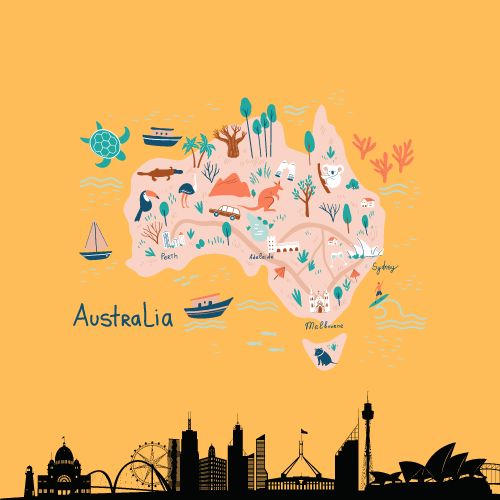Australian Slang is a dictionary of Australian slang, colloquialisms and idioms. Our Aussie slang section includes words and phrases that Australians use in everyday language, as well as many unique expressions that you will hear around Australia.
See also our Australian Slang section with over 700 words and phrases listed.
| EDITOR’S BLOG Topics | |||
| • Slang | • Holidays | • Food | • Odds & Sods |
| • Music | • Animals | • Writers | • Daylight Saving |
| • Sports | • People | • Problems | • Big Things |
| • Charity | • Awards | • What Is It? | • Comments |
What’s a Specky?
Rosie wrote us, “I watch Doc Martin on the television (English comedy) and my question is about a word I heard used on this week’s program. I think the word I heard is “specky” and the context it was used in was to say that a person is a little daft, not right, etc. but I can’t find it in your slang dictionary.”
Well Rosie, that’s because Doc Martin is a British TV series filmed in the UK, not Australia. While Aussies may have some slang in common with the Brits, here in Australia the slang “specky” means something different.
Specky is slang for “spectacular mark” in Australian rules football. In a typical specky, a player jumps high up often on another player’s back in order to catch (mark) the ball.
St Kilda and South Melbourne footballer Roy Cazaly was known for his high-flying specky. AFL fans loved seeing a specky so much that they would shout “Up There Cazaly” at his games.
In 1979 the Two Man Band took that chant and created the song Up There Cazaly. The song sold over 250,000 records becoming the biggest selling Aussie single up to that time.
The song is still a favourite of sports fans and often heard at games and on TV especially during the AFL Grand Final.
Visitors to Freemantle, WA can see a statue capturing Australian rules footballers John Gerovich’s famous specky over Ray French in 1956. The statue is outside Freemantle Oval.
BYO and Corkage
Ross M. suggested we add ‘BYO’ and ‘corkage’ to our Aussie Slang area and we have.
If you want a heated discussion by the restaurant going public, ask them how they feel about corkage. Simply put, corkage is a fee charged by many BYO restaurants if you bring your own drink. Even if you open and pour your own wine, you will still be charged corkage.
There is no regulation and no standard on corkage charges. Clearly restaurants want you to buy your wine from them so some see it as a BYO deterrent. However, they also run the risk of losing a customer who feels the corkage is excessively high.
Not all restaurants charge corkage, but of those that do we’ve heard prices from $2 per person to a flat $20 per bottle and up.
So the next time you make a reservation at a restaurant and plan to BYO, make sure you ask about their corkage fee. It may not pay to BYO.
Military Banjos
Shane was nice enough to share this with us …”Just want to clear up under military slang you have for ‘Banjos’. You are right, they are a bacon and egg roll/sandwich.”
“The reason for calling them ‘Banjos’ is that when you eat them, the egg yolk or bread crumbs get on the front of your clothing (usually in the chest area). The normal reaction is to extend the arm out that is holding the bread and with the free hand flick the yolk and crumbs off of your chest and clothing. This makes it look like you are playing a Banjo.”
Interesting the things you can learn here.
Rumours ~ Furphys
During the First World War quite a few slang words were coined. Some are no longer used while some still survive today.
For example, “furphys” are slang for rumours. Just as today people gossip on their coffee breaks, during the war rumours were passed around as mobile water tanks travelled through the troops.
The water tanks were manufactured by Joseph Furphy & Sons, hence slang for rumours became “furphys”.
Military Goffa
Maurice L asked, “How come you do not have the term “Goffa” meaning soft drink or cordial in your Military Slang.
Actually we do. It’s listed as “Goffer” but I’ve just added “Goffa” to it as well. The Aussie slang is thought to originally come from the name of the company (Goffe & Sons) that manufactured the drinks. With a living language, you’ll always find variations over the years and generations.
More Military Slang
Mel wrote to say, “Thanks for your military slang section – very enjoyable (and accurate!). I thought of a couple more family friendly Army ones.” Ernie also sent us some military slang as well.
• Drop Shorts – artillery soldier
• Emu Bob (Emu Parade) – line of soldiers
walking almost shoulder to shoulder
bobbing up and down picking up litter
• Nard Roll – toilet paper
• Two-dads – someone with a hyphenated
surname (ie. John Smith-Jones)
• WOMBAT – Waste Of Military Budget
And Time
Update Lots of requests for more Australian military slang, so I’ve added more and created a new ANZAC Slang section as well.
A big “Ta” to all the guys who contributed to it.
Up The Duff
Andrew wrote to us wanting to know what the origins of the Aussie phrase “up the duff” is. He knew that it means that a woman is pregnant, but wondered where the saying came from.
We found the phrase “up the duff” in Baker’s 1941 publication Dictionary of Australian Slang. So it’s been in common usage for at least 60 year.
We believe that the roots of the phrase “up the duff” comes in part from the euphemistic terms used for the gentleman’s organ that causes the lady’s condition. (How’s that for using euphemisms ourselves!)
One of the many slang words used for the organ in question is “pudding” So one might refer to that woman as being “in the pudding club” since in Victorian times it was impolite to discuss pregnancy directly.
One of the definitions for “duff” is a “stiff flour pudding boiled in a cloth bag or steamed”. Simply put, one of the meanings for “duff” is a pudding.
As a result is “up the duff” becomes another way to say “in the pudding club”. And that in turn means “to be pregnant”.
More Emails on Slang
Americanisms?
I get emails from people from time to time letting me know an American word or phrase has crept into our site.
Mum not Mom
The most embarrassing Americanism I’ve let sneak into our website is using Mom instead of Mum.
Sometimes the email is from someone who is extremely upset they found an American word on our Australian website.
Daylight Savings Again!
I suppose the words I keep getting the most heated emails is ‘Daylight Savings’.
Putting that ‘s’ at the end is like waving a red flag to some people. Read my reply about it.
Thankfully most people who write me are very understanding how easy it is to use an American word by mistake especially when we hear it so often on the many American shows found on Australian television.
OK or not?
Ian M. wrote me that he thought ‘OK’ was an Americanism and I might try using something more Aussie.
The origin of ‘Okay’, I believe, is American. However, it’s one of those words that has gained common usage by people all over the world. I never thought about ‘OK’ being an Americanism, but following Ian’s suggestion, I did a search of our website’s 1,500 plus pages. It was only on a couple of pages and I changed the wording.
One last thought
Did you know every single Australian website on the Internet uses the American spelling of a certain word instead of the Australian spelling? Can you guess what that word is?
Pump Water Slang?
A Canadian dad wanted to know what ‘Pump Water’ was. It was on a Wollongong high school canteen menu he saw. That’s not slang. It’s just a brand of bottled water in Australia made by Coca-Cola.
How Do You Pronounce It ?
Sue Beth from America said she was told that we pronounce aluminium funny. We don’t know why it would sound funny to you. You’re the one with the accent!
Here’s a small list of some differences
| word | USA | Australia |
| Aluminium | a-lum-in-um | al-u-min-e-um |
| Nisan | nee-san | niss-n |
| Adidas | ah-d-das | add-a-das |
| Memo | mem-o | me-mo |
| Melbourne | mel-born | mel-burn |
| Brisbane | briz-bane | briz-bin |
Slang Answers
To Marianne, a Bush Telly is slang for campfire while a Telly is a television. Why is a Bush Telly a campfire? Perhaps watching the campfire is the closest thing to a telly you’ll find when camping.
To confuse things a bit further, a Bush Telly is not the same as a Bush Telegraph. That means to spread information by word-of-mouth such as gossip.
To Maria from Chile, a Bushman’s Clock is a kookaburra. Why? Because it loudly announces the new day.
To Aiko in Japan, a Chalkie is a teacher and a Chippie is a carpenter.
And finally, to Billy in the USA, yes, some Aussies really do use rhyming slang. Travis on the Aussie TV show Big Brother used it all the time! And no, not everyone here understood him either.
To Lurch or Not to Lurch
Ben wrote us wanting to know what or where is a lurch. He’s referring to the saying “left in the lurch”.
Not strictly Aussie slang, but a saying used in many countries. It means “abandoned in a difficult position without help.”
So what is a lurch? We did some research and learned that in the 1500’s there was a French game called Lurch. If you were stuck and had no way to win, you were said to suffer a lurch. The game was popular and “left in the lurch” eventually became part of our language.
What Do Aussies Call Bread ?
Chichi asked “What is Australian bread called and how is it made? Please I have a project on this topic.”
Australian bread is called bread. We have all kinds of bread at our grocery stores.
If you mean the original way bread was made in Australia, it was called Damper. You can find my Damper recipe here
Many of us still make and eat Damper especially when we go camping or when we cook on the barbie. It’s also good first recipe for children to try. I even had them serve Damper at my own outdoor wedding.
Mum or Mom ?
Kylie had a go at us for using the word “mom” instead of “mum” in a joke from our page of Aussie Jokes for Kids. It’s tough sometimes to keep the Americanisms from creeping into our website. I’ve fixed the joke and searched the rest of our site to find any more mom’s that might be lurking around.
I hope I’ve caught them all, but if you spot a mom where mum should be, let me know.



